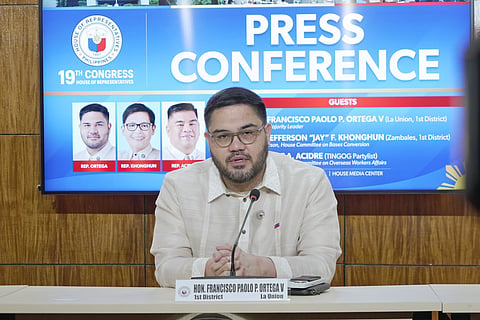
- NEWS
- the EDIT
- COMMENTARY
- BUSINESS
- LIFE
- SHOW
- ACTION
- GLOBAL GOALS
- SNAPS
- DYARYO TIRADA
- MORE

Another batch of suspected “fake names” has been added to the expanding list of supposed dummy recipients of Vice President Sara Duterte’s confidential funds, with the most recent including a surname of “Ewan,” a colloquial term meaning “I have no idea.”
House Deputy Majority Leader Paolo Ortega V on Sunday revealed the list of “suspicious” names found in the acknowledgment receipts (ARs) submitted by Duterte’s office and the Department of Education (DepEd), which she headed for nearly two years, to the Commission on Audit (CoA). These names included “Erwin Q. Ewan,” “Honeylet Camille Sy,” “Feonna Biong,” “Feonna Villegas,” “Fiona Ranitez,” “Ellen Magellan,” “Gary Tanada,” and “Joel Linangan.”
The lawmaker insinuated that these names mimic those of celebrities and high-profile personalities, fueling concerns over the authenticity of the ARs and the potential misuse of the secret funds.
“The repeated use of fake names that seem to be taken from movies and showbiz is no longer funny,” Ortega lamented. “Public funds are at stake. If they can’t show evidence that these individuals are real, this will be strong evidence against her in the impeachment trial.”
According to the La Union lawmaker, the recurring appearance of such “playful” names may no longer be coincidental, indicating a possible systemic attempt to conceal transactions involving confidential funds.
Similar to previously flagged recipients, including “Mary Grace Piattos,” “Jay Kamote,” “Miggy Mango,” “Mico Harina,” and “Ralph Josh Bacon,” the new batch of supposed recipients has no birth, marriage, or death records from the Philippine Statistics Authority (PSA).
Ortega posits that these alleged fictitious names may serve as strong evidence to substantiate the allegations of Duterte’s “wrongdoing,” unless the OVP and DepEd produce clear, verifiable documentation to account for each name listed.
In a separate interview, House prosecutor Lorenz Defensor asserted that the mounting questions surrounding the use of Duterte’s confidential funds must be better answered for the impeachment trial.
“The use and distribution of such funds should not be a joke… If there is anything that needs to be answered, it should be reserved for the impeachment trial,” he said.
"The House of Representatives has been waiting for a sensible answer from DepEd and the OVP since the committee hearings started. If this had been answered correctly and explained thoroughly, it would not have gone deeper, and the people would not have wondered why there are names based on nonsense like those of Piattos,” he explained.
Duterte is set to stand trial before the Senate impeachment court beginning 30 June.
On 5 February, the House of Representatives impeached Duterte on seven articles, citing, among other things, the alleged misuse of P612.5 million in confidential funds from the OVP and DepEd between 2022 and 2023.
House prosecutors say many of the documents submitted to CoA to justify these expenses were riddled with inconsistencies — including receipts bearing incorrect dates, missing names, and now, recipients who seemingly don’t exist.
In recent months, Ortega had revealed a set of alleged bogus names, including “Dodong Gang,” consisting of five individuals whose first name is “Dodong,” “Team Amoy Asim,” referring to “Amoy Liu,” “Fernan Amuy,” and “Joug De Asim,” as well as “Team Grocery,” comprising “Beverly Claire Pampano,” “Patty Ting,” and “Sala Casim.”
Vice President Duterte has vehemently denied corruption allegations involving her confidential funds and cast doubt on the veracity of the names that Ortega had claimed as beneficiaries.
Batangas Rep. Gerville Luistro, also a House prosecutor, dismissed speculations that documents may have already been tampered with, asserting that they were produced by CoA itself, which had flagged the utilization of her P125 million confidential funds in 2022.
Supporters of the VP suggested that these names might be merely aliases used by intelligence assets of her office, citing the confidential nature of the funds.
Luistro, however, argued that using fake identities to hide the personalities of the real recipients is not authorized under Joint Circular No. 2015-01, which governs the use of confidential and intelligence funds.
In recent interviews, former CoA Commissioner Heidi Mendoza, who is running for a Senate seat, explained that aliases alone are insufficient to justify the disbursement of the funds. She clarified that clear and traceable documentation must exist linking these names to actual beneficiaries.
At the height of the congressional investigation into Duterte’s secret funds last year, state auditor Gloria Camora confirmed that Duterte’s office submitted ARs that contained only signatures with no names, had unreadable names, or listed multiple recipients with the same name, prompting lawmakers to assume that the receipts were fabricated or hastily prepared to justify the use of the secret funds.
